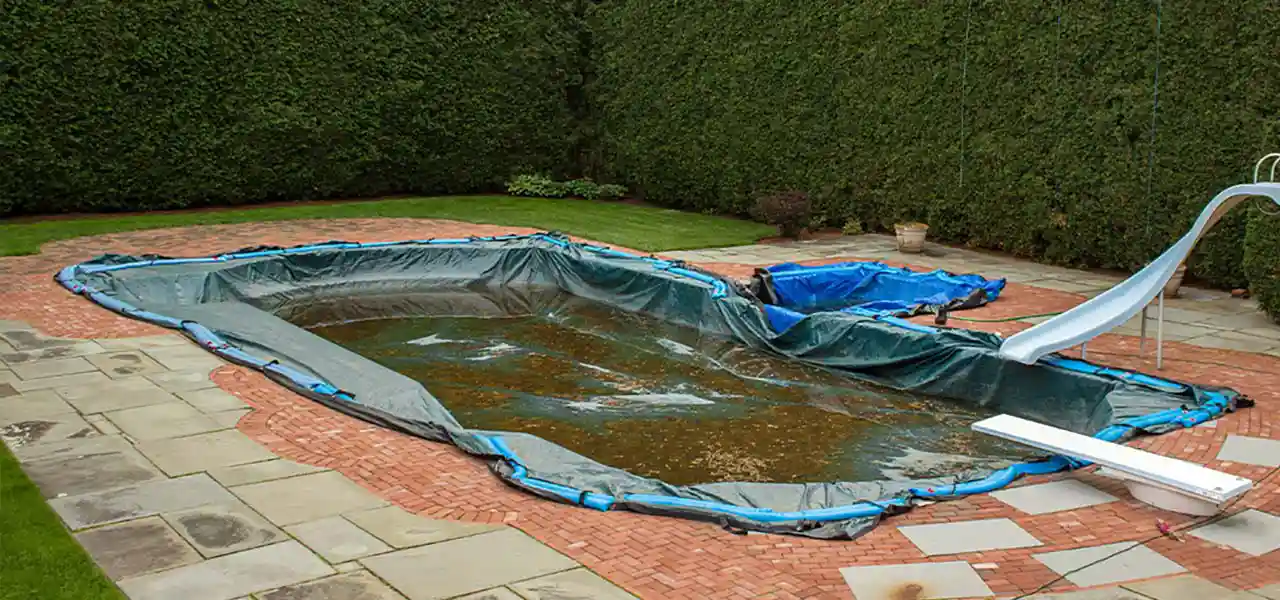FREE Standard Shipping On All Orders $100 or More!*

Not Opening the Pool this Year?
Another swimming pool season is inching closer and closer, which means the time to open up your pool is soon approaching. But what if you don't want to open your pool this year? Can you leave it closed and covered all summer? If you're asking yourselves these questions, than this is the post for you.
Normally, this pool opening season is met with great excitement, as pools owners wait with anticipation for the moment they can finally get back into their pool. But not this year. Maybe you plan to travel more than normal, or the pool needs a major renovation, or for financial reasons, you’ve decided the pool shall stay closed for the summer. OK, what now? You know what to do to close a pool and open it again, but what do you do to keep a pool covered and closed?
Let's dive into some tips for keeping your pool closed all summer.
What Should You Do?

First, even if your pool is closed, you still need to maintain it. Pools are not designed to stay stagnant during the warm months of the year, and pool covers deteriorate faster in strong summer sunlight. Leaving the pool closed all summer is a guaranteed way to end up with a green, smelly mess and permanent stains or damage to the pool surfaces.
We recommend brushing the pool well, and adding water balancers as needed. Then add a stain and scale preventing chemical, followed by a strong algaecide, and a floater full of chlorine tablets. All of these chemicals are included in our winter chemical kits.
Furthermore, keep the water level below the skimmer line to avoid damaging your plumbing equipment. Use a cover pump to remove any excess water on top of your pool cover. Rainwater can settle on the cover and then drain into your pool, raising the water level. Water also weakens the cover fibers over time, making the cover less safe. Keep the pool water level a few inches below the tile, or 8"–10" below the cover.
Phone a Friend
If you can't manage all this work, ask a neighbor, a family member, or a pool service to maintain the water regularly. Without maintenance, your pool liner or plaster will deteriorate and cost a pretty penny to fix when you choose to reopen the pool.
If you don't mind the possibility of permanent stains, and possible damage to the pool structure, you can forego any maintenance. This is a good option if you are planning to start from scratch with a pool renovation.
Don't Drain the Pool!

Whatever you do, do NOT drain the pool. Pools are not meant to be empty for an extended period of time and. This will lead to extensive damage and costly repairs. The damage is different for inground pools and above ground pools, but equally devastating.
If your pool has a vinyl liner and you drain all the pool water at any time of the year, you risk ruining the pool liner. Especially for older liners, if you drain the pool completely, the vinyl liner will likely rip when trying to refill the pool later. The liner will shrink, harden, and slowly disintegrate if not left filled with water.
Inground Pool Damage
Inground pools face a different threat. If you drain your inground pool for any length of time, you’re likely to see cracks form in the plaster, which will shrink and crack if left dry in warm temperatures — even with a pool cover on it. Delaminations can also occur, leading to "pop-offs" of plaster in areas of the pool.
Having no water in your inground pool lends the potential for catastrophic damage. If you drain your pool completely, and the water table around the pool is high, the hydrostatic pressure of the ground water can actually lift your concrete or fiberglass pool out of the ground. It can also 'float' vinyl liners, forcing large puddles of water underneath the liner.
Above Ground Pool Damage
For above ground pools, a drained pool won’t only destroy your vinyl liner, but possibly collapse the pool’s metal walls too. Above ground pool walls are designed to stand up to the sheer force of the water weight, and without that force pressing outward, the walls could fall inward in a strong breeze.
Our Recommendation

Really, you should always open your pool. Believe it or not, opening your pool will save you a truckload of money in the long run. If you keep your pool closed, you will have to drain it, acid wash, or replace the liner the next time you open the pool. Other problems often also occur to the pool or equipment, when a pool stays hibernating.
So unless money is a concern, it’s best to either open and maintain the pool yourself, or hire a pool service, or a local kid home for the summer. Especially if you plan to travel extensively or be out of town for long periods of time.
An option for above ground pool owners is to disassemble your pool entirely if you know you won’t use it for a long time. Just plan on replacing the pool liner when you re-install your pool down the road.
Another option is to open up your pool and keep it covered, but run the pool filter less. The best combination for this scenario is to use a solid pool cover and run your filter for about 3–6 hours a day. Good water balance, a bit of chlorine, and daily filtering will help keep the pool water fairly fresh.
In Summary...
If you're not opening the pool this year, you have 3 options:
- Keep it closed, but maintain good water balance, a good water level, and use chlorine tablet floaters, algaecides and stain away. You can find all of these chemicals in our winter kits.
- Open the pool, but keep it covered all summer, and run the filter only as much as needed. Keep the water balanced and chemically treated.
- Keep it closed and maintain proper water level. Open next year with a drain and clean, or replace the plaster or vinyl liner at the same time.